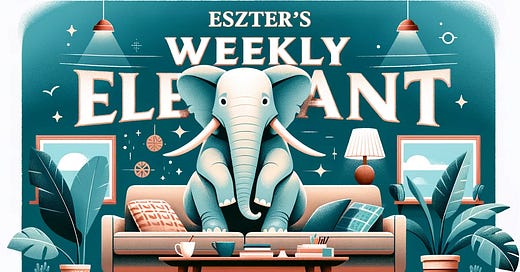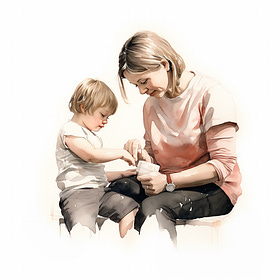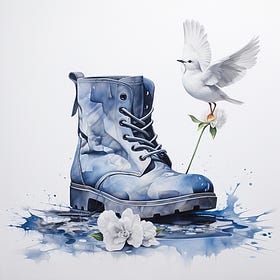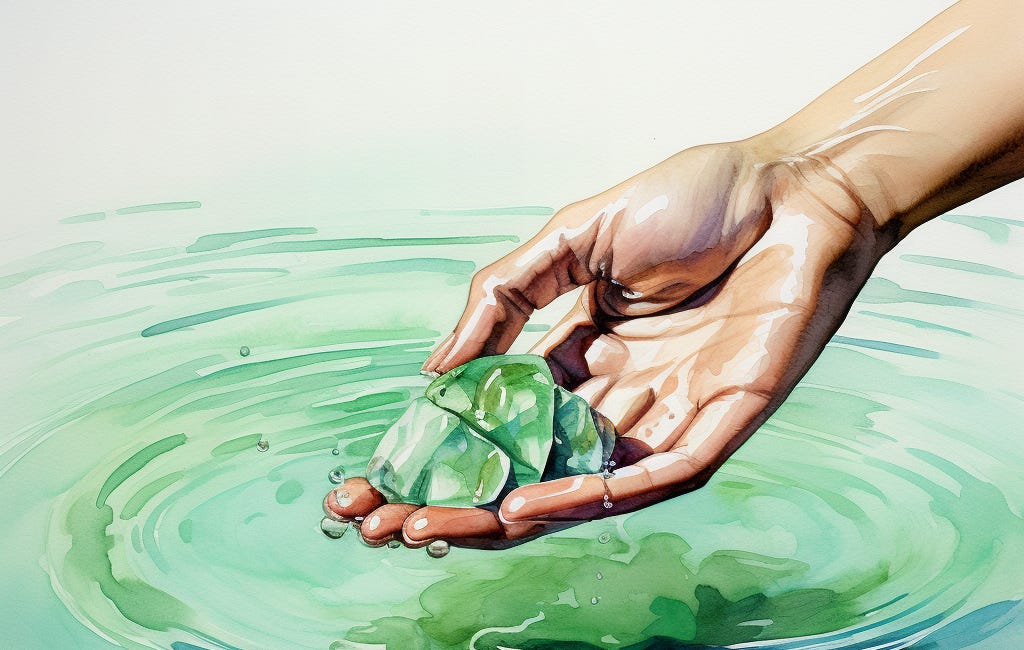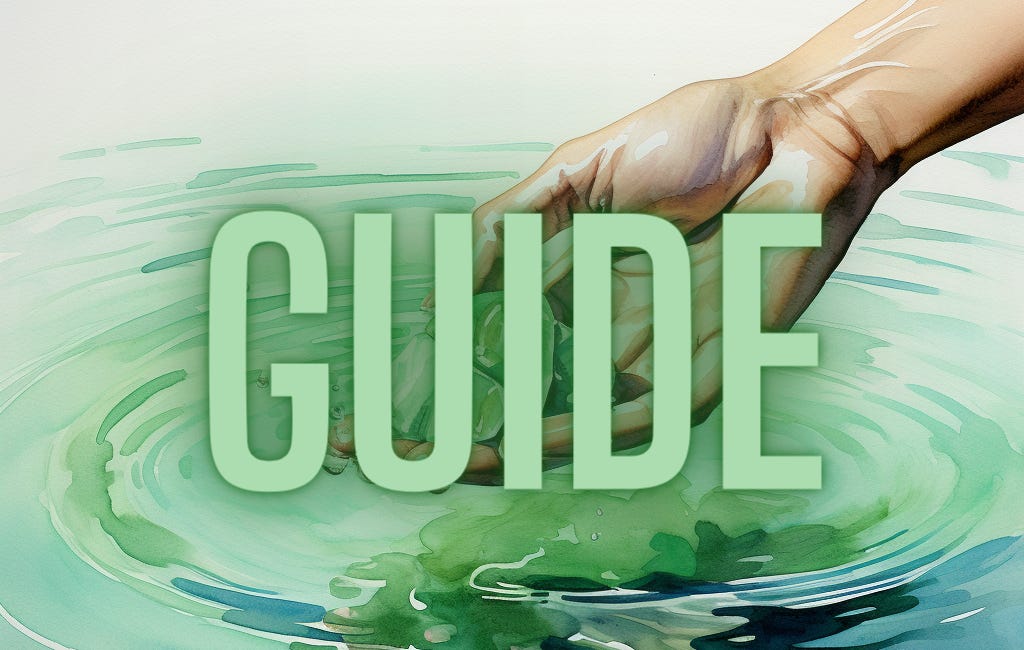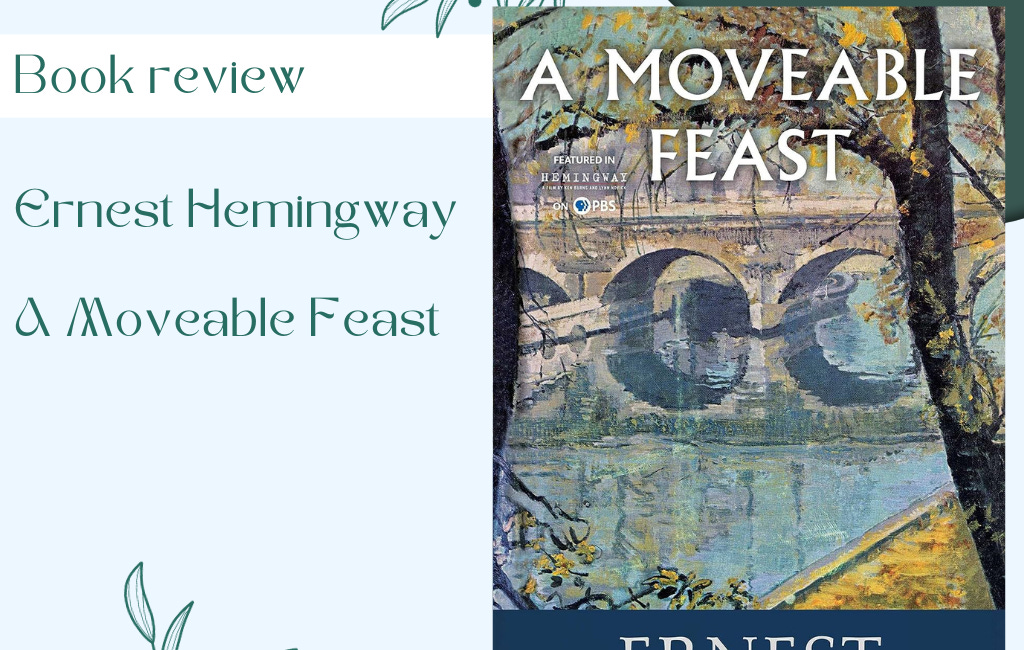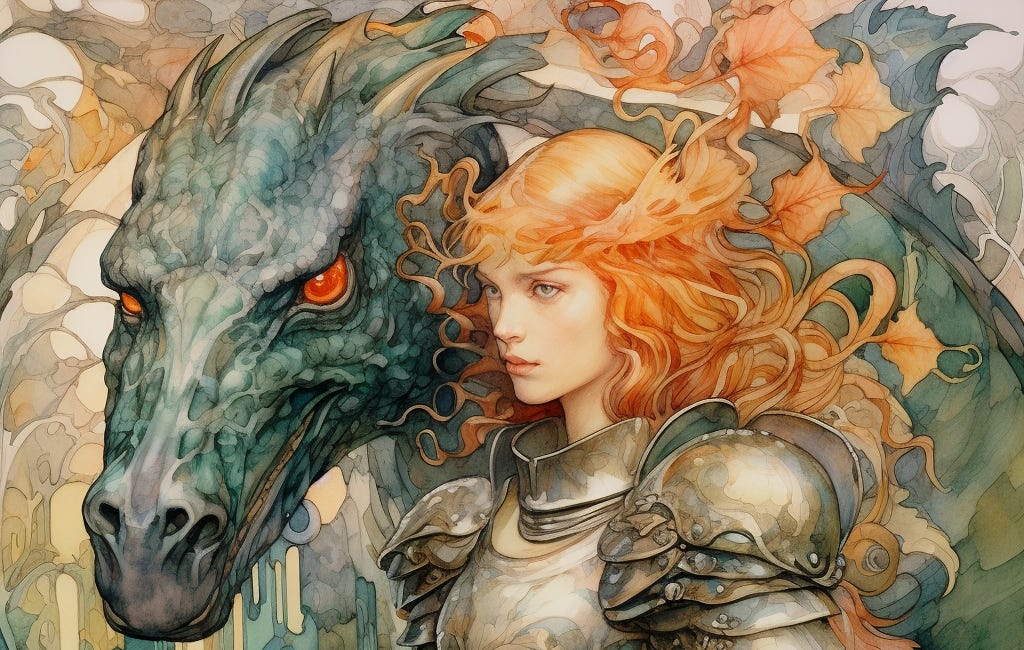Welcome to the third issue of Eszter’s Weekly Elephant!
We hope you had a great week and are ready to dive into some serious, yet exciting topics! My husband and I have engaged in intriguing discussions about the innate female energy, and I must admit, we are far from being able to crisply grasp what it is exactly and how it works. We're not discussing feminism, style, elegance, motherhood, or sexuality here—those are only parts of the bigger picture.
What truly piques our curiosity is that very ancient, elemental power characteristic of the Shaman woman, the Wild Woman, as Clarissa Pinkola Estés, a psychoanalyst, calls it, or the Dakini, as it is known in Tibet. We are interested in the Wild Woman’s power that can give birth and knows the right time for death, who is able to dance the dance of life freely and fiercely. A woman who is not bound by social constructs but is wise enough to know when to compromise and when to bravely protect her convictions against society if needed. The woman who heals or destroys as directed by her most inner part, in constant discourse with Nature. The woman who is a warrior, not with swords in her hands or by shouting harsh words but as a warrior of light—patient, creative, centered, wise, armed with knowledge gained through a deep and sacred connection to Gaia and Nature. The woman who decides about her own life path and is able to persevere and win against all odds. The woman who brings peace, love, who can turn a house into a home, but who is at home wherever her path lands her.
I have read many articles about what women should do, how they should gain a foothold in this patriarchal society, what tools they should use. I've read books about the soft female power that women should adhere to and reintroduce into the world. These books paint a beautiful, silky-soft picture of the all-enduring “real” woman but leave the reader wondering how she can stay safe in a society of swords while living as a huge, soft, love-filled marshmallow.
To be frank, I understand the points of feminism too but have never felt that I could really, wholeheartedly support it, as I feel we, women, lose too much of our power if we accept its premises.It feels like sending a talented archer into a ground battle with a huge sword she can barely hold, instead of letting her do what she does best. On the other hand, I have always felt oppressed by and have seen the injustice and constraints of traditional female roles. So I believe that is not the way to go either.
But then, what is? Well, the question remains for now, but I do not give up searching for the right answer. We, as a society, need to understand how the Wild Woman operates, how she gains her wisdom and energy. That is the only way women can regain their incredibly important place in society and let men find their own real powers and roles, not those that today’s society pushes them to acquire.
We continue our research and our discussion to find and define the main characteristics of the Wild Woman. I promise to let you know what we have found, and then hopefully, we can hear your opinions as well!
So we embark on this quest, armed with the already gathered knowledge, in the hope of finding what we are looking for and won’t give up on it, just as this elegant fellow below doesn’t give up on his. :)
This week in Eszter’s Weekly Elephant we were discussing a simple and very logical reason why we need to clean our emotional wounds, just as we would a cut on our hand. It sounds too straightforward to even talk about it, reminding me of an incident with Rihanna's wealth manager, who was sued by the star for his mishandling of her finances. He reportedly said something like, "I did not know we have to explain to people that if they buy a lot of stuff with their money, they will end up with a lot of stuff and not money."
Well, sometimes we need to state the obvious to remind ourselves of its importance. Thoroughly cleaning our emotional wounds is imperative. Though I often hear people say that old stories should be forgotten, that they have reconciled with their perpetrator or attacker at least within themselves, I always know that's not truly the case.
There was even a lady who commented on my post “How to Start Healing from Childhood Sexual Abuse,” where I wrote that first we must articulate our feelings, and it's alright if we feel anger, even hatred. We can say it out loud. It's nothing to be ashamed of. The lady wrote that it's not right if the victim says they hate the perpetrator. Well, having worked with many people who survived childhood sexual abuse, I can tell you from my experience that unless they heal those traumas, they really do hate their perpetrator. And who are we to tell them what to feel? They are trying to overcome something horrible. They are trying to heal, reconcile, and move on. I think we should give them the space and understanding to freely express their true feelings because knowing where we stand is the first and most important step. Otherwise, how could we get to our intended destination if we are not even aware of where we are, right?
Childhood sexual abuse is just one type of trauma or wound many of us need to heal and reconcile. The most important thing is that we start taking action toward healing, no matter what happened to us in the past. Entertaining the illusion of being healed, the trauma being forgotten, the perpetrator forgiven without having undergone the actual healing process is the worst kind of self-sabotage. These wounds affect our lives in a plethora of ways, even if we are not aware of their profound influence.
So, if you haven’t yet read the article about our festering emotional wounds, please do and think about it!
By the way, did you know there is a difference between saying “please forgive me” and “I am sorry”?
It is actually a very important distinction. In family constellations, we never say “please forgive me”; we always say “I am sorry, this is the best I could do at the time.” The reason is that by saying “please forgive me,” we give power over ourselves to another human being, which isn't right. I've seen many cases where this power was then abused, and the victim became a tyrannical perpetrator by denying forgiveness to the other. This results in more conflict instead of resolution. On the contrary, when we say “I am sorry,” we clearly communicate that we are aware of the pain and hurt we have caused, realize our mistake, accept our responsibility, and intend to avoid behaving like that in the future, but we do not give power over ourselves to the other.
Next time you need to apologize for something, I suggest you try both ways and feel which one clears the air faster and restores balance more easily between you and the person you hurt. Generally, those who force others, often their children, to say “please forgive me,” are usually the ones who seek authority over the other person and grasp every opportunity to achieve their goal.
After this short detour let’s talk about why do we need lard on lines? According to my experience, these unresolved traumas are often the root of unwanted weight gain. I had many clients who experienced intense food cravings, some even daily, while others gained weight gradually. By the time they realized something was off, they struggled with 15-30 lbs or more of excess weight. They counted calories, attended HIIT trainings, tried cutting carbs, going gluten-free, avoiding sugar, and even hired personal trainers. However, even after some success, they found themselves living and eating the same way they did when they started their slim-down project.
In my experience, the reasons for not being able to stick to a diet, consume fewer calories, or maintain an exercise routine are, on one hand, simple, and on the other, complex. As James Clear so perfectly said in his book "Atomic Habits," "Self-discipline is not a long-term strategy." That is, we are human beings, not programmed robots. We face challenges, endure hardships, and get emotional. Therefore, we are not able to make the right decision against our emotional surges all the time. Basing a strategy on constant self-discipline simply shows a lack of self-awareness and a deficit in knowledge of human nature.
To transform ourselves from overweight to thin, from a person eating 4000 calories per day to one who eats half of that, from someone who never exercises to someone who runs, for example, we have to embody a new person. If even after losing the right amount of weight, we see ourselves as the person who is usually overweight and is for now slim, the person who needs to count calories to stay thin, or the person who has to force themselves to run to maintain the appropriate weight, we are still the same overweight person in our minds, battling our pounds.
We might have lost the intended weight, but more often than not, we are unable to maintain the results we achieved. In other words, we can reach our goal, we can climb to the top of the mountain, but then we slide down on the other side. We are unable to set up camp at the top.
To set up camp at the top of the mountain, we must become a thin person in our minds as well. Not an overweight person who has just lost weight and struggles to maintain the healthy form, but a thin person. We must become someone who doesn’t have to count calories because they are the person who eats only 1500 calories a day. We must become a runner, not just somebody who ran to slim down. The methods we used to reach our goals need to be built into our personality and internalized so that we literally become a different person.
I hope I have explained the difference. Now, here comes the catch. All of us have a different set of beliefs, fears, and other negative emotions trapped in our subconscious, rooted in the belief systems of our surroundings and the traumas we have endured. We can call it our subconscious backpack.
That subconscious backpack led us to become who we are at the present moment, whether that be overweight, angry, pessimistic, happy, kind, smart, or not... Who we are is deeply affected by that backpack. If the person we are happens to be overweight, it means there are beliefs, traumas, and emotions in that backpack that resulted in extra pounds. So, whenever we try to lose weight and become thin, we must fight our way through those beliefs, traumas, and emotions that tell us to do otherwise. Even if for a short period we succeed in fighting them—meaning we stick to our calorie count, running routine, or whatever it is we do—there comes a point when we fall back into the old routine because these programs are forcing us to remain unchanged 24/7, but we are not able to be self-disciplined 24/7 for years.
That is why, to reach our goal and maintain the results, we need to become a different person—a thin person, a moderately eating person, a runner... because then becoming overweight again is out of the question as we are not a usually overweight person who happens to be thin for a while, or a big-eater who eats less for now, or a never-exercising person who is able to force themselves to run these days anymore. But to achieve this, we need to change the picture of ourselves in our minds. To change the beliefs about ourselves, guess what we need to change? The weight and health-related beliefs and the feelings rooted in traumatic experiences that somehow affect our weight. This is how we can achieve long-standing results.
For more information on the most common causes of weight gain and a great tool that can help you understand what causes your food cravings, read the article! Let us know how the quick self-awareness exercise went!
Why Do We Need Lard on Lines? – The Emotional Roots of Weight Gain
Moving on to another interesting subject, we would like to direct your attention to an older, but still significant post about friendships. We often hear people say that old friendships are gold, we usually nod in agreement and don’t give that sentence another thought. However, there is an important question we need to ponder when deciding whom we should be loyal to through fire and rain and whom we should let go of.
Here it is:
Eszter’s Reading Nook
Moving on to Eszter’s Reading Nook, for my fellow bookworms, we published my third short story, which is very close to my heart as it describes my own experiences. This is one of the few short stories I wrote in the first person singular, given the fact that I, myself, had a vanishing twin brother. For those not familiar with the term vanishing twin, the Guide offers detailed information about this phenomenon, along with some simple questions that may shed light on whether you yourself had a vanishing twin or not. At the end of the Guide, we offer some advice on how to start the healing process if you happen to be one of us…
Apart from the short story and its guide, we published a book review for those looking for their next read. This week we chose Hemingway’s book titled "A Moveable Feast." This memoir-like story collection gives us a glimpse not only into Hemingway’s early years in Paris but also into the Parisian literary scene. We meet Gertrude Stein, F. Scott Fitzgerald, Sylvia Beach, James Joyce, and others through Hemingway’s eyes. It is a truly fascinating experience!
Eszter’s Magic
In Eszter’s Magic, as always, we share more personal perspectives about our journey of self-discovery and finding, nurturing our creativity. In "Saint-Eszter and Her Dragons," we discuss the never-ending vigilance we all need to avoid feeding our bad habits, fears, and other non-grata feelings. Remember, even Hagrid’s small, just-hatched dragon set fire to his beard. Can you imagine what would have happened if that dragon were bigger than his house? It wouldn’t have been only his beard that went up in flames, right?
As my husband and I prepared some meals together this week, we reflected on our not-so-smooth history of cooking together. We've come a long way and decided to share our story, from being two chefs as stubborn as goats fighting in the kitchen over pasta to becoming a chef and a line cook laughing over our past differences. Dive in!
This week we also introduced what we call literary bonbons. These are, just like bonbons, little stories, sometimes only glimpses into a life, a place, and a time, condensed into merely 150 words. Believe me, this is not easy! After writing down the first version, usually 190-220 words, slimming it down to 150 words without losing valuable information, the atmosphere of the story, and its flow, is a real editorial bloodbath. Here is the first one, located in Budapest, my hometown:
Well, that is all for the week!
Staying in the realm of food, we hope you will enjoy the appetizing posts, the more substantial short stories that require more digesting, and the delicacies, such as the literary bonbons, along with our personal stories and perspectives.
We are intrigued to know what you think of our work, so please leave a comment below and let us know!
Happy reading!
Disclaimer: The content in our publications should not be considered professional psychological or psychiatric advice. Therefore, everyone reads the articles and applies their content at their own risk.
Some links above are Amazon affiliate links, and if you buy something through these links I may earn a small commission at no extra cost to you.
Home | Notes | Articles | Eszter’s Magic | Literary Bonbons | Short Stories and Guides | Beyond the Book | EWE Issues | Archive | About

